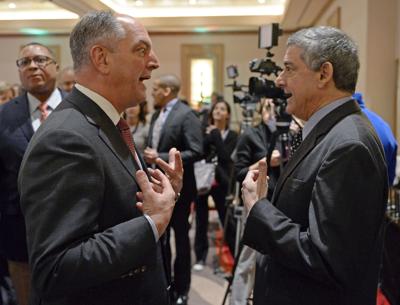Back when Jay Dardenne was still Louisiana’s lieutenant governor and planning his campaign for the top job, he got a visit one day from a second-term Democratic state representative from Tangipahoa Parish.
A guy by the name of John Bel Edwards came to share the news that he too would be a candidate in the 2015 gubernatorial election.
Dardenne, a Republican who’d previously been a high-profile state senator and secretary of state, recalled in a recent interview that he knew Edwards “as a very impressive representative challenging (then-Gov. Bobby) Jindal,” whose fiscal policies were under fire from many Republicans as well.
But like so many others, Dardenne dismissed the idea that a Democrat could win in Louisiana and recalled that during their “very cordial” initial conversation, he told Edwards so. He went for it anyway, and the rest is oft-told history.
But before Edwards pulled off his stunning runoff win against then-U.S. Sen. David Vitter and went on to serve two terms as the state’s chief executive, Dardenne said the two got to know one another better as they both traveled the state to speak at early candidate events. When Vitter and Edwards landed in the runoff — after a series of blistering attacks from Vitter that left Dardenne visibly furious — Dardenne was ready to make the dramatic choice to endorse the Democrat over a fellow Republican.
“When I didn't make the cut — you know, it was a difficult campaign where a lot of things were said that were not true — I just felt like, having known John Bel and listened to him on the campaign trail, I thought he was a better person,” Dardenne said. “I knew I would be scorned by the Republican Party, but I've been scorned before by the Republican Party. That's another story.”
But even then, there was another shoe to drop. After Edwards won, he asked Dardenne to forego retirement plans that were already in the works and join his administration, which was gearing up to tackle a massive budget shortfall inherited from Jindal that turned out to be far worse than either of them knew.
And that was the start of a remarkably productive relationship that, to the surprise of many, lasted the full eight years of Edwards’ tenure.
When Edwards leaves office next month, Dardenne will pack up his belongings at the commissioner of administration’s office as well, after having traded being a top elected official in his own right to a key staffer in charge of budgetary matters for another.
“I wanted the challenge, and I figured if I was running for governor trying to fix the problems that we have, I could have the opportunity to do it at the division,” he said last week.
The details of the state’s hard-won financial reversal have been detailed elsewhere, but the bottom line is that Edwards and Dardenne worked — sometimes tensely — with the Republican-led Legislature to turn a $2 billion hole into a surplus, to bolster funds meant to be there in a rainy day instead of pulling from them, to reverse disinvestment in things like higher education and to find money for priorities like early education.
A wonk like Edwards, Dardenne has often been the face of the administration’s financial decisions, including during the first few years, when they finally wrested a temporary sales tax increase out of the Legislature.
“I certainly knew based on my experience, and he knew, that you're not going to come in here and cut $2 billion out of the budget and say, ‘I'm not going to raise your taxes.’ It was pretty obvious,” he said.
Dardenne said last week that despite their political differences, he could count the disagreements he and Edwards have had on one hand.
Eight years later, those political differences still exist. Despite his anti-abortion position and pretty regular entreaties from the other party, Edwards remains a Democrat. And Dardenne is absolutely still a Republican — a Nikki Haley Republican, not a Donald Trump Republican, he emphasizes — who still doesn’t believe that party trumps all.
“When I first ran for office, I ran because I was not satisfied with what Edwin Edwards was doing and the way the state was going under the leadership that was in place back in the late 1980s,” Dardenne said. “And so I've always believed that people ought to be voting for the person and not voting strictly on party, particularly at local and statewide level.”
In a way, this odd-couple partnership is a throwback.
But as Louisiana follows the country down the ugly path of all-out polarization, it should also be a reminder that the best results often happen when we do what Edwards and Dardenne have done and look for ways to work together, not tear our opponents apart.

